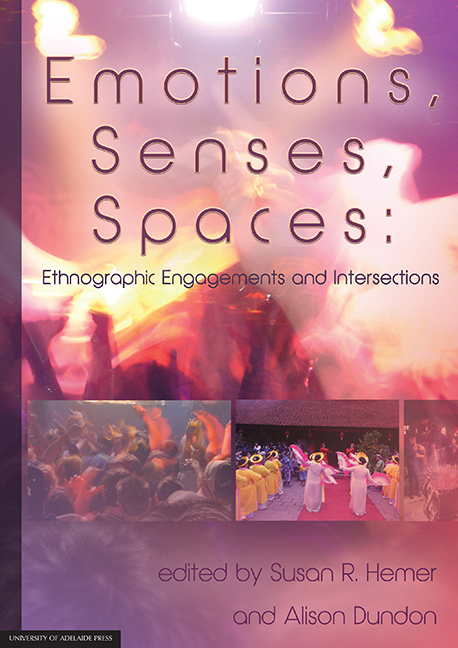Book contents
- Frontmatter
- Contents
- Biographies
- 1 Ethnographic intersections: Emotions, senses and spaces
- 2 ‘Dancing for joy’: Gender and relational spaces in Papua New Guinea
- 3 Creating the right ‘vibe’: Exploring the utilisation of space at Hip Hop concerts in Adelaide and Melbourne
- 4 Pontic dance: Feeling the absence of homeland
- 5 Emotional actors/Affective agents: Interspecies edgework and sociotechnical networks in the Spanish bullfight from horseback (rejoneo)
- 6 Sensual feasting: Transforming spaces and emotions in Lihir
- 7 Anxious spaces: The intersection of sexuality, the senses and emotion in fieldwork in Nepal
- 8 Interrupted research: Emotions, senses and social space in (and out of) the field
- 9 Voices in the park: The composition of sacred space and public place
- 10 Ngadha being-in-common: Emotional attachment to people and place in Flores, Indonesia
- 11 Trust your senses: Growing wine and making place in McLaren Vale
2 - ‘Dancing for joy’: Gender and relational spaces in Papua New Guinea
Published online by Cambridge University Press: 25 July 2017
- Frontmatter
- Contents
- Biographies
- 1 Ethnographic intersections: Emotions, senses and spaces
- 2 ‘Dancing for joy’: Gender and relational spaces in Papua New Guinea
- 3 Creating the right ‘vibe’: Exploring the utilisation of space at Hip Hop concerts in Adelaide and Melbourne
- 4 Pontic dance: Feeling the absence of homeland
- 5 Emotional actors/Affective agents: Interspecies edgework and sociotechnical networks in the Spanish bullfight from horseback (rejoneo)
- 6 Sensual feasting: Transforming spaces and emotions in Lihir
- 7 Anxious spaces: The intersection of sexuality, the senses and emotion in fieldwork in Nepal
- 8 Interrupted research: Emotions, senses and social space in (and out of) the field
- 9 Voices in the park: The composition of sacred space and public place
- 10 Ngadha being-in-common: Emotional attachment to people and place in Flores, Indonesia
- 11 Trust your senses: Growing wine and making place in McLaren Vale
Summary
Abstract
Among the Gogodala of Papua New Guinea, a predominantly rural population in the Western Province, dance is a site of considerable emotion. Owama gi — ‘dancing for joy’ — is particularly so, a seemingly spontaneous series of sensuous movements through which women express both pleasure and pride in the beauty and ability of their male kin as well as the efficacy of their own webs of relatedness. Women express their compulsion to dance at these occasions in terms of expressions like ‘you cannot help yourself’. In this chapter, I examine the performance of owama gi as the sensual and embodied generation of what I refer to as relational space, in which happiness, pride and pleasure in relationships between women and their children, fathers, uncles and brothers are elicited and appreciated. At the same time, dancing for joy is an overtly public performance of the central role that women play in the lives and achievements of their kin. I analyse the ways in which, although understood as spontaneous expressions of pleasure and joy, such dances and the behaviour of those who perform them are highly proscribed. The chapter seeks to contribute to an analysis of the substantive connection between space, sensory experience and human emotions through an exploration of the ways in which the senses and emotions both generate, and are generated by, certain kinds of gendered relationships and performative spaces.
Introduction
The articulation of emotion is spatially mediated … [W]hen we speak of the ‘heights of joy’ and the ‘depths of despair’, significant others are comfortingly close or distressingly distant. (Davidson & Milligan 2004:523)
It is September 1995. I am sitting behind a recently erected bamboo fence that runs the length and breadth of the football field in Balimo with over one thousand people who, like me, are there to watch the dances, canoe races, sports and other performances that make up the Balimo Show. Although I had been in the Gogodala‑speaking area of the Western Province of Papua New Guinea for more than eight months by this stage, conducting research for my doctoral thesis, this was the first formal event that I had attended which brought together these performances.
- Type
- Chapter
- Information
- Emotions, Senses, SpacesEthnographic Engagements and Intersections, pp. 17 - 30Publisher: The University of Adelaide PressPrint publication year: 2016



